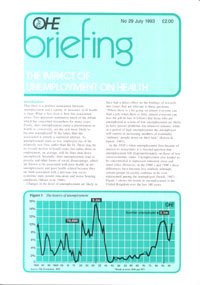Sign up to our newsletter Subscribe
Taking STRIDES: The Value of Diagnostics Against AMR

That there is a positive association between unemployment and a variety of measures of ill health is clear. What is less clear is how this association arises. Two questions summarise much of the debate which has concerned researchers for many years. Firstly, does…
That there is a positive association between unemployment and a variety of measures of ill health is clear. What is less clear is how this association arises. Two questions summarise much of the debate which has concerned researchers for many years. Firstly, does unemployment cause a deterioration in health or, conversely, are the sick more likely to become unemployed? If the latter, then the association is merely a statistical artefact. As unemployment starts to rise, employers lay of the relatively sick first, rather than the fit. There may be no overall decline in health states but rather those in employment, on average, will be fitter than those unemployed. Secondly, does unemployment lead to poverty and other forms of social disadvantage, which are known to be associated with poor health, or are unemployment and poor health related because they are both associated with a previous low socioeconomic state, poorer education and worse housing conditions (Moser et al, 1986).
In this briefing we:
• look at the overall incidence of unemployment and its impact on different groups within the community;
• set out why being in employment is important for most people’s wellbeing, for reasons over and above the need to earn money;
• examine critically, in turn, the evidence for a link between unemployment and deteriorating mental health and between unemployment and deteriorating physical health;
• estimate the potential costs to the NHS of unemployment;
• summarise our assessment, concluding with the implications for employment and health policy.
The Impact of Unemployment on Health
Griffin, J.
(1993) The Impact of Unemployment on Health. OHE Briefing. Available from https://www.ohe.org/publications/impact-unemployment-health/